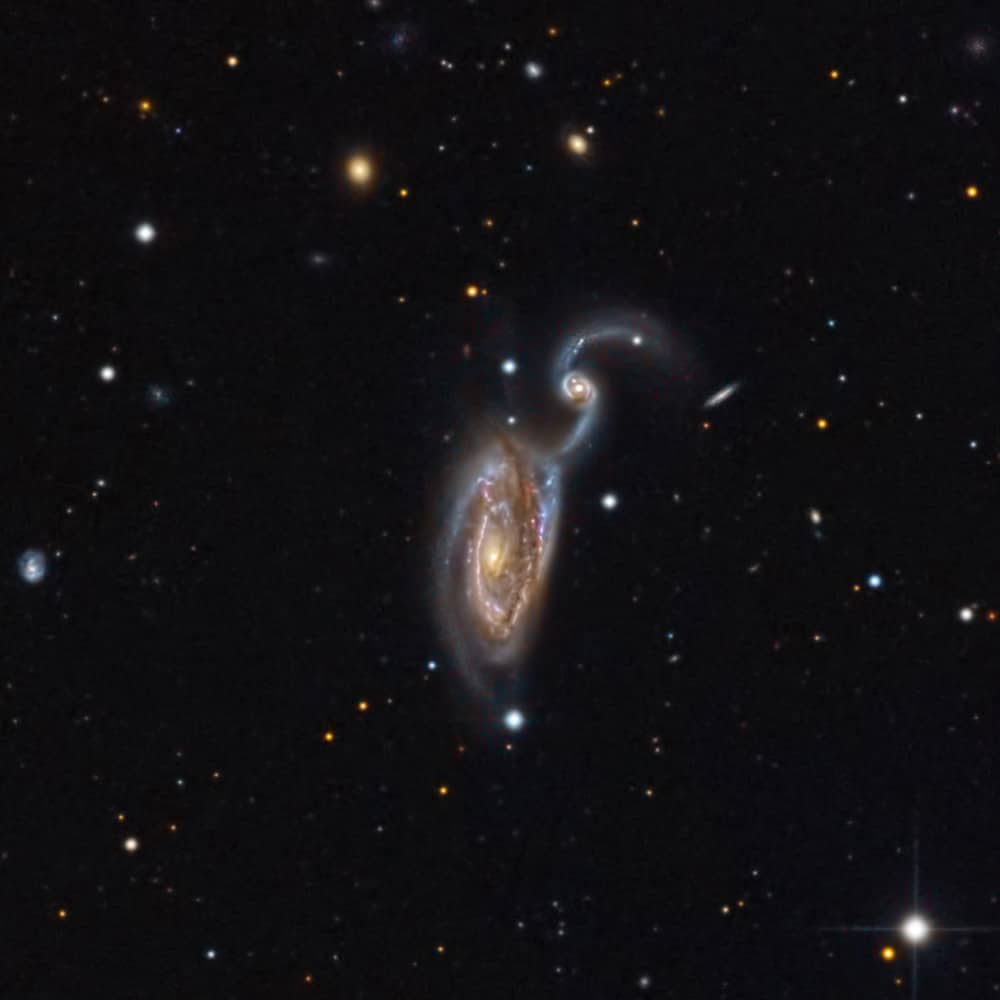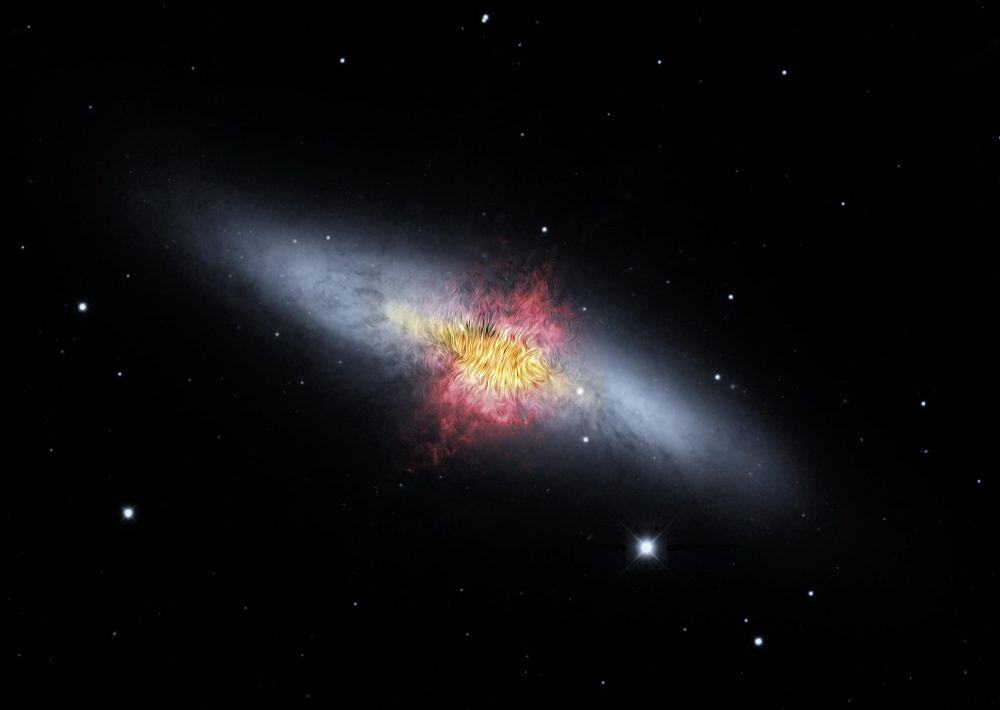Blog
IC 2177 (also known as vdB 93 ) is an emission and reflection nebula visible in the constellation of the Unicorn .
It is identified on the western edge of the Seagull Nebula , a large region H II connected to a molecular nebula complex in which star-formingphenomena take place, and ideally constitutes the “head” of the bird; its position is about 3 ° to ENE of θ Canis Majoris , an orange star of fourth magnitude . It appears as a cloud with a rounded shape, with a dense dark line that crosses it from the north and a luminous arched band that stretches southwards; its brightness allows it to be easily photographed even with medium power amateur instruments and observed through special filters. The mass of the cloud is about 16,000 M ⊙ and is placed to the west of the long luminous trail of the body of the Seagull Nebula;the gas it contains is partly ionized and partly illuminated by reflection due to the radiation coming in particular from HD 53367, a blue giant withextremely high and extremely young emissions ; this star is the primary component of a binary system that includes this and a smaller star, surrounded by a protoplanetary disk , which performs a very eccentric orbit around the primary. This star system is part of the OB Canis Major R1 association, a subgroup of the larger Canis Major OB1 association, whose main feature is the link with extensive reflection nebulae.
more...James Vernon Taylor (born March 12, 1948) is an American singer-songwriter and guitarist. A five-time Grammy Award winner, he was inducted into the Rock and Roll Hall of Fame in 2000. He is one of the best-selling music artists of all time, having sold more than 100 million records worldwide.
Taylor achieved his breakthrough in 1970 with the No. 3 single “Fire and Rain” and had his first No. 1 hit in 1971 with his recording of “You’ve Got a Friend“, written by Carole King in the same year. His 1976 Greatest Hits album was certified Diamond and has sold 12 million US copies. Following his 1977 album, JT, he has retained a large audience over the decades. Every album that he released from 1977 to 2007 sold over 1 million copies. He enjoyed a resurgence in chart performance during the late 1990s and 2000s, when he recorded some of his most-awarded work (including Hourglass, October Road, and Covers). He achieved his first number-one album in the US in 2015 with his recording Before This World.
He is known for his popular covers, such as “How Sweet It Is (To Be Loved by You)” and “Handy Man“, as well as originals such as “Sweet Baby James“.
James Vernon Taylor was born at Massachusetts General Hospital in Boston on March 12, 1948, where his father, Isaac M. Taylor, worked as a resident physician. His father came from a wealthy Scottish family from the South, however, part of his ancestral roots are deep in Massachusetts Bay Colony and include Edmund Rice, one of the founders of Sudbury, Massachusetts.
https://www.youtube.com/watch?v=JOIo4lEpsPY
more...Don Drummond (12 March 1932 – 6 May 1969) was a Jamaican ska trombonist and composer. He was one of the original members of The Skatalites, and composed many of their tunes.
Drummond was born at the Jubilee Hospital in Kingston, Jamaica, to Doris Monroe and Uriah Drummond. He was educated at Kingston’s Alpha Boys School, where he later taught his younger schoolmate Rico Rodriguez to play the trombone.
His musical career began in 1950 with the Eric Dean’s All-Stars where he performed jazz. He continued into the 1960s with others, including Kenny Williams.
After performing jazz for a decade, Drummond began performing ska and in 1964 Don joined The Skatalites. With Drummond’s politicized conversion to the Rastafari movement, other band members followed his lead. He became a household name in Jamaica, before suffering mental problems. He was rated by pianist George Shearing to be among the world’s top five trombone players.
In 1965 Drummond was convicted of the murder of his longtime girlfriend, Anita “Marguerita” Mahfood, an exotic rhumba dancer and singer, on 1 January 1965. He was ruled criminally insane and imprisoned at Bellevue Asylum, Kingston, where he remained until his death four years later. The official cause of death was “natural causes”, possibly heart failure caused by malnutrition or improper medication, but other theories were put forward; some of his colleagues believed it was a government plot against the Kingston musical scene, and some believed that he was killed by gangsters as revenge for the murder of Mahfood. Heather Augustyn, author of a biography of Drummond published in 2013 claimed to have proved that Drummond’s death was caused by his medications.
more...Jesse Fuller (March 12, 1896 – January 29, 1976) was an American one-man band musician, best known for his song “San Francisco Bay Blues“.
In the 1920s he lived in southern California, where he operated a hot-dog stand and was befriended by Douglas Fairbanks. He worked briefly as a film extra in The Thief of Bagdad (1924) and East of Suez. In 1929 he settled in Oakland, across the bay from San Francisco, where he worked for the Southern Pacific Railroad for many years as a fireman, spike driver, and maintenance-of-way worker. He married, and he and his wife, Gertrude, had a family. During World War II, he worked as a shipyard welder, but when the war ended he found it increasingly difficult to secure employment. Around the early 1950s, Fuller began to consider the possibility of making a living as a musician.
Up to this point, Fuller had never worked as a full-time professional musician, but he was an accomplished guitarist and he had carried his guitar with him and busked for money by passing the hat. He had a good memory for songs and had a large repertoire of crowd-pleasers in diverse styles, including country blues, work songs, ragtime and jazz standards, ballads, spirituals, and instrumentals. For a while, he operated a shoe-shine stand, where he sang and danced to entertain passersby. He began to compose songs, many of them based on his experiences on the railroads, and also reworked older pieces, playing them in his syncopated style. When he set out to make a career as a musician, he had difficulty finding reliable musicians to work with: thus his one-man band act was born, and he started calling himself “The Lone Cat.”
more...Sweden
more...NGC 3486 is an intermediate barred spiral galaxy located about 27.4 million light years away in the constellation of Leo Minor. It has a morphological classification of SAB(r)c, which indicates it is a weakly barred spiral with an inner ring and loosely wound arms.This is a borderline, low-luminosity Seyfert galaxy with an active nucleus. However, no radio or X-ray emission has been detected from the core, and it may only have a small supermassive black hole with less than a million times the mass of the Sun.
more...Robert Keith McFerrin Jr.,also known as Bobby, (born March 11, 1950) is an American jazz vocalist and conductor. A ten-time Grammy Award winner, he is known for his unique vocal techniques, such as singing fluidly but with quick and considerable jumps in pitch—for example, sustaining a melody while also rapidly alternating with arpeggios and harmonies—as well as scat singing, polyphonic overtone singing, and improvisational vocal percussion. He is widely known for performing and recording regularly as an unaccompanied solo vocal artist. He has frequently collaborated with other artists from both the jazz and classical scenes.
McFerrin’s song “Don’t Worry, Be Happy” was a No. 1 U.S. pop hit in 1988 and won Song of the Year and Record of the Year honors at the 1989 Grammy Awards. McFerrin has also worked in collaboration with instrumentalists, including pianists Chick Corea, Herbie Hancock, and Joe Zawinul, drummer Tony Williams, and cellist Yo-Yo Ma.
McFerrin was born in Manhattan, New York City, the son of operatic baritone Robert McFerrin and singer Sara Copper. He attended Cathedral High School in Los Angeles and the California State University, Sacramento.[citation needed]
McFerrin’s first recorded work, the self-titled album Bobby McFerrin, was not produced until 1982, when McFerrin was already 32 years old. Before that, he had spent six years developing his musical style, the first two years of which he attempted not to listen to other singers at all, in order to avoid sounding like them. He was influenced by Keith Jarrett, who had achieved great success with a series of improvised piano concerts including The Köln Concert of 1975, and wanted to attempt something similar vocally.
more...Astor Pantaleón Piazzolla (Spanish pronunciation: [pjaˈsola], Italian pronunciation: [pjatˈtsɔlla]; March 11, 1921 – July 4, 1992) was an Argentine tango composer, bandoneon player, and arranger. His oeuvre revolutionized the traditional tango into a new style termed nuevo tango, incorporating elements from jazz and classical music. A virtuoso bandoneonist, he regularly performed his own compositions with a variety of ensembles.
In 1992, American music critic Stephen Holden described Piazzolla as “the world’s foremost composer of tango music”.
Piazzolla was born in Mar del Plata, Argentina, in 1921, the only child of Italian immigrant parents, Vicente “Nonino” Piazzolla and Assunta Manetti. His paternal grandfather, a sailor and fisherman named Pantaleo (later Pantaleón) Piazzolla, had immigrated to Mar del Plata from Trani, a seaport in the southeastern Italian region of Apulia, at the end of the 19th century. His mother was the daughter of two Italian immigrants from Lucca in Tuscany.
In 1925 Astor Piazzolla moved with his family to Greenwich Village in New York City, which in those days was a violent neighbourhood inhabited by a volatile mixture of gangsters and hard-working immigrants. His parents worked long hours and Piazzolla soon learned to take care of himself on the streets despite having a limp. At home he would listen to his father’s records of the tango orchestras of Carlos Gardel and Julio de Caro, and was exposed to jazz and classical music, including Bach, from an early age. He began to play the bandoneon after his father spotted one in a New York pawn shop in 1929.
https://www.youtube.com/watch?v=p1uTHTMnbTI
more...Alex or Aleck Miller (né Ford, possibly March 11 or December 5, 1912 – May 24, 1965), known later in his career as Sonny Boy Williamson, was an American blues harmonica player, singer and songwriter. He was an early and influential blues harp stylist who recorded successfully in the 1950s and 1960s. Miller used various names, including Rice Miller and Little Boy Blue, before calling himself Sonny Boy Williamson, which was also the name of a popular Chicago blues singer and harmonica player. To distinguish the two, Miller has been referred to as Sonny Boy Williamson II.
He first recorded with Elmore James on “Dust My Broom“. Some of his popular songs include “Don’t Start Me Talkin’“, “Help Me“, “Checkin’ Up on My Baby“, and “Bring It On Home“. He toured Europe with the American Folk Blues Festival and recorded with English rock musicians, including the Yardbirds, the Animals, and Jimmy Page. “Help Me” became a blues standard, and many blues and rock artists have recorded his songs.
Miller was born Alex Ford (pronounced “Aleck”) on the Sara Jones Plantation in Tallahatchie County, Mississippi. The date and year of birth are uncertain. He claimed to have been born on December 5, 1899, but David Evans, professor of music and an ethnomusicologist at the University of Memphis, claims to have found census records that he was born around 1912, being seven years old on February 2, 1920, the day of the census. His gravestone in or near Tutwiler, Mississippi, set up by record company owner Lillian McMurry twelve years after his death, gives his date of birth as March 11, 1908, but has no basis for being recognized as accurate.
https://www.youtube.com/watch?v=WBW9hYLsSHE
more...NGC 5395 and 5394, together known as Arp 84 or the Heron Galaxy, are two interacting galaxies located just over 160 million light-years away from Earth in the small northern constellation of Canes Venatici (the Hunting Dogs). It takes little imagination to see a blue heron’s body, complete with neck, head and a beak reaching out to a nearby fish.
The larger, NGC 5395, is a somewhat elongated, nearly face-on spiral galaxy of about 140 thousand light-years across, located about 162 million light-years away from Earth, while it receding from us at approximately 3511 kilometers per second. NGC 5394, also face-on galaxy, is a barred spiral of about 90 thousand light-years across, located 161 million light-years away, while it is receding from us at approximately 3448 kilometers per second.
The main disk of NGC 5395, with a bright, elongated central region, is asymmetric and distorted due to interaction with its nearby companion NGC 5294. The dominant spiral arm of this two-armed spiral galaxy forms a large ring somewhat off center with respect to the nucleus. Obscuring dust lanes can be seen throughout the galaxy.
The smaller galaxy, NGC 5394, has an oval disk, two long, fairly symmetric, open tidal arms, and very bright inner spiral arms, disjoint from the outer tidal arms. Most of the gas in NGC 5394 is concentrated around the center, so is suitable for fueling the ongoing starburst in its center. Despite the presence of hydrogen gas, two of the three inner spiral arms of NGC 5394 show no evidence of ongoing star formation.
On June 25, 2000 the Type Ic supernova SN 2000cr was discovered in NGC 5395, northeast of the nucleus.
Types Ic (and Ib) supernovae are caused by the core collapse of massive stars and are usually referred to as stripped core-collapse supernovae. These stars have shed (or been stripped of) their outer envelope of hydrogen, and lack the absorption line of silicon. Compared to Type Ib, Type Ic supernovae have lost more of their initial envelope, including most of their helium.
more...
Norman Blake (born March 10, 1938) is a traditional American stringed instrument artist and songwriter.
Blake was born in Chattanooga, Tennessee, and grew up in Sulphur Springs, Alabama. He listened to old-time and country music on the radio by the Carter Family, the Skillet Lickers, Roy Acuff, and the Monroe Brothers (Charlie and Bill Monroe). He learned guitar at age 11 or 12, then mandolin, dobro, and fiddle in his teens. When he was 16, he dropped out of school to play music professionally.
In the 1950s, Blake joined the Dixieland Drifters and performed on radio broadcasts, then joined the Lonesome Travelers. When he was drafted in 1961, he served as an Army radio operator in the Panama Canal Zone. He started a popular band known as the Kobbe Mountaineers. A year later, while he was on leave, he recorded the album Twelve Shades of Bluegrass with the Lonesome Travelers.
more...John Donald “Don” Abney (March 10, 1923 – January 20, 2000) was an American jazz pianist.
Abney was born in Baltimore, Maryland. He studied piano and french horn at the Manhattan School of Music, and he played the latter in an Army band during military service.
After returning from the army he played in ensembles with Wilbur de Paris, Bill Harris, Kai Winding, Chuck Wayne, Sy Oliver, and Louis Bellson. He had a sustained career as a session musician, playing on recordings for Louis Armstrong, Benny Carter, Oscar Pettiford, Ella Fitzgerald, Carmen McRae, Sarah Vaughan, Eartha Kitt, and Pearl Bailey. He also played on a large number of recordings for more minor musicians and on R&B, pop, rock, and doo wopreleases.
more...https://www.youtube.com/watch?v=C2a5V9Igrlc
more...The Cigar Galaxy is the archetypal starburst galaxy, having experienced two recent spates of star formation. One occurred10 million years ago in its nucleus, and another sprang up 5 million years ago in a ring around the galaxy’s core. This froth of starbirth drives a so-called galactic superwind: dust, gas, and radiation that flow out of the galaxy and into intergalactic space.
To observe this wind, Terry Jay Jones (University of Minnesota) and colleagues applied for time on NASA’s SOFIA airborne observatory, which soars above much of the atmosphere that would absorb the infrared light it’s designed to collect. A modified Boeing 747 flies the 2.7-meter telescope in whatever careening trajectories are necessary to best view its targets that night.
Jones and colleagues used the High-resolution Airborne Wideband Camera-plus (HAWC+) instrument aboard SOFIA to observe far-infrared light (at wavelengths of 53 and 154 microns) coming from the Cigar Galaxy. Hot dust within giant, gaseous star-factory clouds emits this light. But dust isn’t perfectly spherical; dust grains tend to be oblong, and they tend to align with the ambient magnetic field that threads the galaxy. So the emission from these dust grains is polarized in a way that tells astronomers which way the magnetic field is pointing.
What Jones’s team found was that within 2,000 light-years of the galaxy’s center, the wind that charges into intergalactic space carries the galaxy’s magnetic field along with it. The polarization in the image above shows that the magnetic field is pretty much vertical in this central region. Outside this region, the magnetic field is horizontal, threading the plane of the galaxy.
more...
More Posts
- World Music with George Abdo
- Daily Roots with Damian Marley and Nas
- Geoffrey Oryema Ugandan musician Passes
- The Cosmos with IC 2631
- George Russell Day
- Milt Hinton Day
- World Music with Mustapha Tettey Addy
- Daily Roots with Turbulence
- The Cosmos with NGC 4565
- Kris Kristofferson Day
- Ray Mantilla Day
- Cal Green Day
- World Music with ESTRELLA MORENTE
- Daily Roots with Sizzla
- The Cosmos with NGC 5426/27
- Eric Reed Day
- Lalo Schifrin
- Skip James Day
- World Music with Alekos K. Vretos
- Daily Roots with Ijahman Levy



